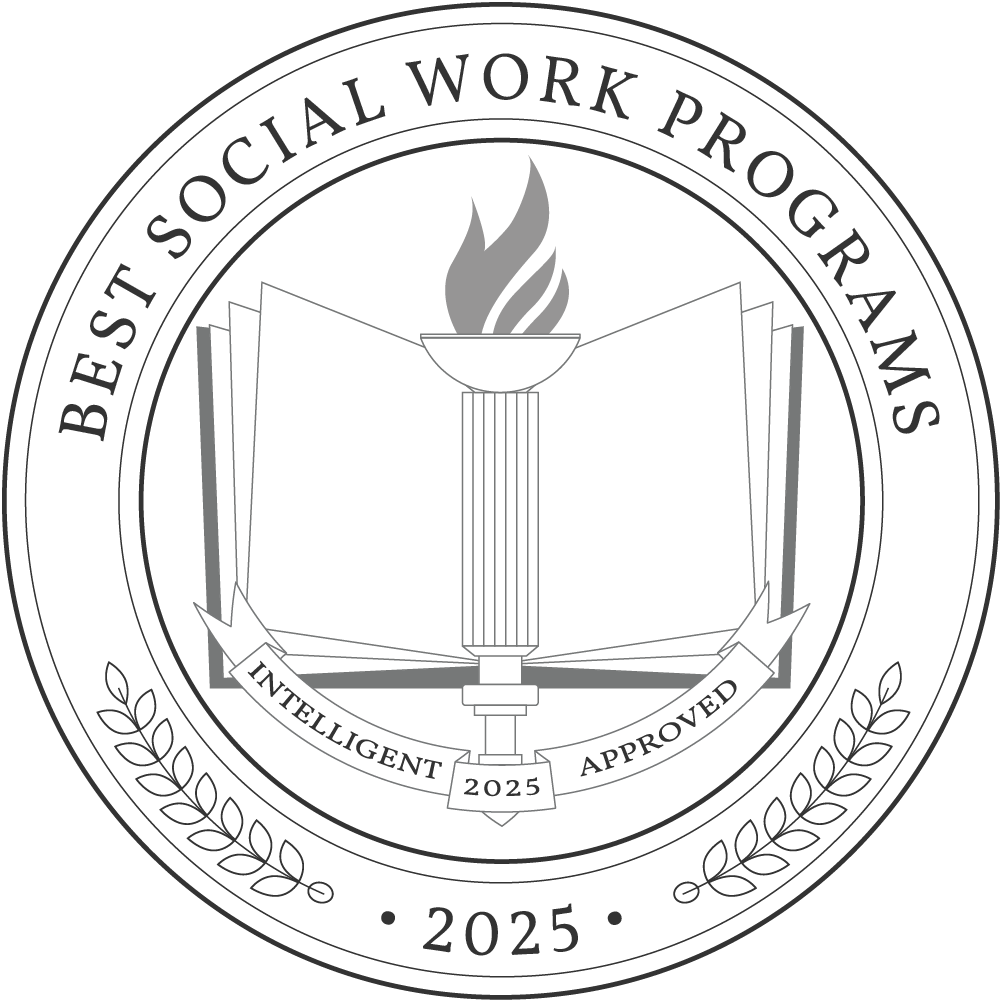Social workers play a crucial role in society, advocating for social justice, supporting vulnerable populations, and facilitating positive community changes. The best social work degree programs feature innovative curriculums that prepare students for rewarding careers in this field, where the median salary of $55,350 surpasses the national median and is expected to grow by 7% over the next decade.
These programs, typically completed in four years at the undergraduate level and two years at the graduate level, underscore the profession’s standing as primarily a master’s-entry field. The average tuition costs for the 2020-2021 academic year are $25,910 for undergraduates and $19,749 for graduates, representing a significant investment in a future of meaningful, impactful work.
Why Trust Us
The Intelligent.com Higher Education Team is dedicated to providing students with independent, equitable school and program rankings and well-researched resources. Our expert-driven articles cover topics related to online colleges and programs, paying for school, and career outlooks. We use data from the U.S. Department of Education’s College Scorecard, the National Center for Education Statistics, and other reputable educational and professional organizations. Our academic advisory team reviews content and verifies accuracy throughout the year for the most current information. Partnerships do not influence rankings or editorial decisions.
- Analyzed over 2,000 national, accredited, and nonprofit colleges and universities
- 800+ rankings pages are reviewed and updated yearly
- Content is informed by reputable sources, surveys, and interviews with academic advisors and other experts
- Over 100 data points are reviewed for accuracy and quality throughout the year, including sources
How we rank schools
Our list features the best Social Work degree programs at top colleges nationwide. Each school featured is a nonprofit, accredited institution — either public or private — with a high standard of academic quality for post-secondary institutions.
We evaluated each school’s program on tuition costs, admission, retention and graduation rates, faculty, reputation, and the student resources provided for online students. We collected data from trusted sources like the National Center for Education Statistics, individual school and program websites, school admissions counselors, and other data sources. Then, we calculated the Intelligent Score on a scale of 0 to 100 based on the following criterion:
Academic Quality:
- Admission rate versus enrollment rate
- Retention rate of students who return after year one
- Accreditation status (regional and programmatic)
- Nonprofit status, both private and public institutions
Graduation Rate
- Overall graduation rate
- Total number of currently enrolled students, including diversity metrics
- Student-to-faculty ratio
Cost and ROI
- In-state and out-of-state per-credit tuition rates and fees
- Required credits to graduate
- Earning potential after graduation
- Availability of federal student loans, scholarships, and other financial aid options
Student Resources
- Available student services for online-only and hybrid programs
- On-campus amenities like tutoring centers and the number of libraries
Read more about our ranking methodology.
Best 46 Accredited Social Work Programs
FiltersInstitution Type
Status
- Intelligent Score
- Alphabetically By University Name
- Acceptance Rate
- Enrollment
- In-state Graduate Tuition
- Out-of-state Graduate Tuition
- In-state Undergraduate Tuition
- Out-of-state Undergraduate Tuition

University of Washington School of Social Work
Intelligent Score: 99.48In-state: $10,629
Out-of-state: $37,998
In-state: $16,278
Out-of-state: $16,278
SAT: 1200-1453
ACT: 27-33
Residenr: $455
Non-Resident: $1,435
On-Campus
Council on Social Work Education
180

University of California, Berkeley
Intelligent Score: 98.25In-state: $11,442
Out-of-state: $41,196
In-state: $11,442
Out-of-state: $11,442
SAT: 1310-1530
ACT: 30-35
$417
On-Campus
Western Association of Schools and Colleges Senior College and University Commission
120

University of Texas at Austin
Intelligent Score: 98.09In-state: $11,448
Out-of-state: $40,032
In-state: $12,028
Out-of-state: $12,028
SAT: 1210-1470
ACT: 26-33
Social work is the primary focus of the University of Texas's Steve Hicks School of Social Work. A wide variety of programs are offered within the school, including bachelor's, master's, doctoral, and postdoctoral programs. Extensive fieldwork opportunities are available through the school's hundreds of partnerships with agencies and professional social workers in Austin and beyond who provide structured learning for B.S.W. and M.S.S.W. students. At the bachelor's degree level, students complete 122 credit hours of coursework along with 480 hours of field internships and 60 hours of service learning in a community agency. Study abroad programs are available, including international field placements. A B.S.W. honors program is available that challenges students to conduct their own research and write a thesis under the direction of a social work faculty member.
Residenr: $473
Non-Resident: $1,691
On-Campus
Council on Social Work Education
122

University of Illinois at Urbana - Champaign
Intelligent Score: 98In-state: $14,317
Out-of-state: $33,824
In-state: $15,016
Out-of-state: $15,016
SAT: 1200-1460
ACT: 27-33
Residenr: $423
Non-Resident: $1,061
On-Campus
Council on Social Work Education
120

Florida State University
Intelligent Score: 97.23In-state: $4,640
Out-of-state: $19,084
In-state: $9,684
Out-of-state: $9,684
SAT: 1220-1350
ACT: 27-31
In-State: $215
Out-of-State: $721
On-Campus
Council on Social Work Education
120

NYU Silver School of Social Work
Intelligent Score: 96.8In-state: $52,204
Out-of-state: $52,204
In-state: $34,704
Out-of-state: $34,704
SAT: 1370-1540
ACT: 31-34
$1,844
On-Campus
Council on Social Work Education
128

Ohio State University
Intelligent Score: 96In-state: $10,615
Out-of-state: $32,599
In-state: $11,560
Out-of-state: $11,560
SAT: 1210-1430
ACT: 26-32
$492
On-Campus
Council on Social Work Education
120

University of Wisconsin - Madison
Intelligent Score: 95.32In-state: $9,273
Out-of-state: $37,161
In-state: $10,728
Out-of-state: $10,728
SAT: 1260-1460
ACT: 27-32
Resident: $502
Non-Resident: $1,727
On-Campus
Council on Social Work Education
120

Florida International University
Intelligent Score: 95.19In-state: $4,721
Out-of-state: $16,529
In-state: $8,912
Out-of-state: $8,912
SAT: 1110-1260
ACT: 23-29
In- State: $153
Out-of-State: $566
On-Campus
Council on Social Work Education
120

University of Utah
Intelligent Score: 94.88In-state: $7,412
Out-of-state: $26,017
In-state: $6,666
Out-of-state: $6,666
SAT: 1130-1350
ACT: 22-29
Resident: $258
Non-Resident: $890
On-Campus
Council on Social Work Education
122

University of Central Florida
Intelligent Score: 94.67In-state: $4,478
Out-of-state: $19,810
In-state: $6,916
Out-of-state: $6,916
SAT: 1160-1340
ACT: 25-30
In- State: $212
Out-of-State: $748
On-Campus
Council on Social Work Education
120

University of Georgia
Intelligent Score: 94.42In-state: $9,790
Out-of-state: $28,830
In-state: $8,878
Out-of-state: $8,878
SAT: 1250-1460
ACT: 29-33
In-State: $326 - $484
Out-of-State: $961 - $1,425
On-Campus
Council on Social Work Education
120

CUNY Lehman College
Intelligent Score: 92.1In-state: $6,930
Out-of-state: $14,880
In-state: $11,090
Out-of-state: $11,090
SAT: 1170-1340
ACT: 25-31
Resident: $305
Non-Resident: $620
On-Campus
Council on Social Work Education
120

Texas A&M University at Central Texas
Intelligent Score: 91.01In-state: $8,395
Out-of-state: $36,849
In-state: $6,775
Out-of-state: $6,775
SAT: 1160-1380
ACT: 26-32
$419
On-Campus
Council on Social Work Education
120

University of Iowa
Intelligent Score: 90.1In-state: $8,073
Out-of-state: $30,036
In-state: $10,079
Out-of-state: $10,079
SAT: 1110-1310
ACT: 22-29
$376
On-Campus
Council on Social Work Education
120

Arizona State University
Intelligent Score: 89.51In-state: $10,710
Out-of-state: $28,800
In-state: $11,720
Out-of-state: $11,720
SAT: 1100-1320
ACT: 21-28
Resident: $478
Non-Resident: $1,349
On-Campus
Council on Social Work Education
120

Heritage University
Intelligent Score: 89.27In-state: $18,192
Out-of-state: $18,192
In-state: $9,552
Out-of-state: $9,552
SAT: N/A
ACT: N/A
$830
On-Campus
Council on Social Work Education
120

University of South Florida
Intelligent Score: 88.71In-state: $4,559
Out-of-state: $15,473
In-state: $8,350
Out-of-state: $8,350
SAT: 1160-1320
ACT: 25-30
Resident: $105
Non-Resident: $211
On-Campus
Council on Social Work Education
120
How to Choose a Social Work Program
Choose your area of study
Selecting your area of study within social work is crucial, as it aligns your education with your career goals and interests. This decision helps narrow program options to those offering specialized training relevant to your intended field.
Common specializations include clinical social work, ideal for those interested in providing therapy; child and family social work, suiting individuals aiming to protect vulnerable children; school social work, tailored for those focused on student welfare; and healthcare social work, serving graduates wanting to support patients in medical settings.
Research schools and programs
Once you’ve identified your social work specialization, thorough research into programs and schools is essential. Consider the following question to guide your research:
- Has the Council on Social Work Education (CSWE) accredited the program?
- What specific courses and fieldwork opportunities are offered in my area of interest?
- What are the program’s graduation and employment rates?
- How does the program support students in achieving licensure?
To find this information, check the school’s official website, which should provide detailed program descriptions, accreditation status, and academic outcomes. Additionally, attending open houses and speaking directly with admissions counselors can offer insights into the program’s focus, faculty credentials, and support services available to students.
Prepare for tests and applications
With your shortlist of potential schools in hand, it’s time to prepare for tests and applications.
Start by familiarizing yourself with the specific requirements of your chosen programs. For undergraduate admissions, focus on SAT or ACT prep, and consider enrolling in a test prep program if scores play a significant role in admissions. Graduate applicants should similarly prepare for the GRE if required.
Adapt your application essays to illustrate your interest and experiences in social work, reflecting your chosen specialization. For all levels, securing solid letters of recommendation and documenting relevant volunteer or work experience is crucial.
Select your program
When acceptance letters arrive, you may have a significant decision to make. You can simplify this choice by revisiting your initial research criteria and focusing on what matters most to them, such as specialization offerings, program reputation, and location. It’s also crucial to evaluate the total cost of attendance alongside any financial aid opportunities, including scholarships and grants. This comparison ensures the program aligns with your academic and professional goals and fits within your financial means, leading to a well-rounded and informed decision.
Determine how you’ll pay for your degree
To finance your degree without accruing considerable debt, you should prioritize funding sources that do not require repayment. Begin with scholarships and grants, awarded based on merit, need, or specific criteria like area of study or background. Next, consider federal loans offering lower interest rates and flexible repayment options to bridge any financial gaps.
Work-study programs provide part-time jobs related to your field of study, helping you earn money while gaining resume-boosting work experience. If you’re already working, explore employer tuition reimbursement programs — as some employers offer to pay for part or all of your education in related fields.
What Can You Expect From a Social Work Program?
Students pursuing a social work degree program can anticipate a comprehensive education that provides them with the skills to address and advocate for social justice, human rights, and individual well-being.
At the undergraduate level, learners gain foundational knowledge in psychology, sociology, and social work practice, typically over four years. This groundwork prepares them for the more specialized and advanced study at the graduate level, where they delve deeper into clinical practice, policy analysis, and research methods over two years. Social work is predominantly a master’s field, meaning a graduate degree is essential for professional practice.
Many programs incorporate practical elements, like internships and capstone courses, to ensure students acquire hands-on experience in real-world settings, an important step for those aspiring to make a significant impact in the lives of individuals and communities.
Potential courses you’ll take in a social work program
- Introduction to Social Work: This foundational course introduces students to the profession, including its history, values, and ethical principles. Learners explore the roles of social workers in several settings and gain an understanding of the importance of advocacy and social justice in practice.
- Human Behavior and Social Environment: This course examines the interplay between human behavior and social environments across the lifespan. Students learn about theories of individual and community development theories and how social workers apply these theories to assess and intervene in client situations.
- Social Welfare Policy and Services: Focusing on the history, structure, and impact of social welfare policies, this course teaches students how to analyze and advocate for policies that promote social justice and equity. Learners explore the role of social workers in policy development and implementation.
- Clinical Social Work Practice: This course delves into therapeutic techniques and intervention strategies used in social work practice with individuals, families, and groups. Students learn about assessment, diagnosis, treatment planning, and ethical considerations in clinical settings.
- Field Practicum: An essential component of a social work degree, this course provides hands-on experience in a supervised social work setting. Students apply their knowledge and skills in real-world environments, gaining practical experience in client interaction, case management, and professional conduct.
Social Work Degree Frequently Asked Questions
How do I apply to a social work degree program?
For undergraduate programs, you’ll typically need a high school diploma, transcripts, and sometimes standardized test scores from the SAT or ACT. Graduate programs often require a bachelor’s degree, letters of recommendation, a statement of purpose, and GRE scores, though some may waive the GRE for applicants with strong academic backgrounds.
Before applying, reach out to an admissions counselor to discuss your qualifications, program expectations, and any prerequisites you might need to fulfill.
How much does a social work degree cost?
The cost of a social work degree varies, with undergraduate tuition averaging $25,910 and graduate tuition at $19,749 for the 2020-2021 academic year.
Beyond tuition, it’s essential to consider additional expenses like textbooks, course materials, accommodation, and living costs, which can significantly increase the overall cost of earning your degree. Many programs also require internships or field placements that might not be paid, potentially adding travel or other expenses.
Financial aid, scholarships, and grants are available to help offset these costs. These options should be explored early in your application process so that you can successfully budget for your degree — ensuring financial preparedness throughout your educational journey.
How long does it take to earn a social work degree?
Earning a social work degree usually takes four years for a full-time undergraduate student and two years for a full-time graduate student. However, part-time enrollment can extend these timelines, although it is often preferable for students balancing their education with a full-time job or family commitments.
The total number of required credits can also impact the program’s length; programs requiring more credits generally take longer to complete.

